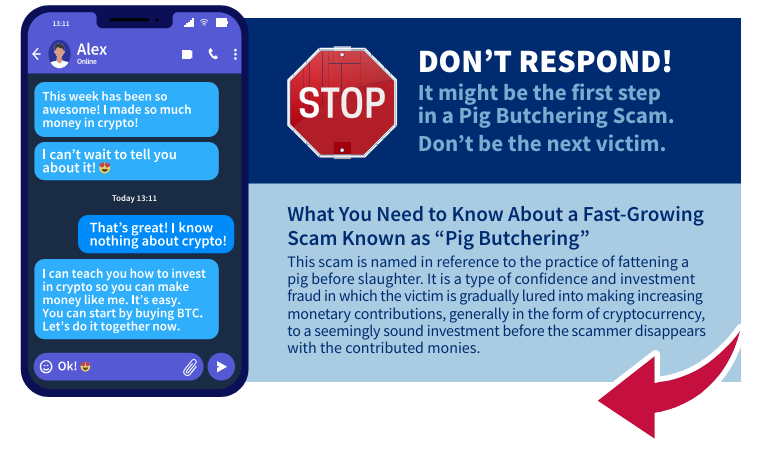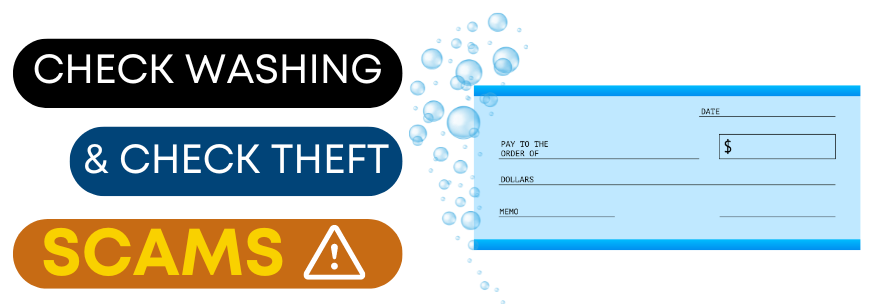
Resources to keep you informed
GNBank is committed to providing financial education programs and resources for our customers, helping strengthen the economic well-being of our community.
Banks Never Ask That
Can You Spot a Phishing Scam?
Every day, thousands of people fall victim to fraudulent emails, texts, and calls from scammers pretending to be their bank. And in this time of expanded use of online and mobile banking, the problem is only growing worse. In fact, the Federal Trade Commission’s report on fraud estimates that American consumers lost a staggering $10 billion to phishing scams and other fraud in 2023—an increase of 13.6% over 2022.
It’s time to put scammers in their place.
Online scams aren’t so scary when you know what to look for. And at GNBank, we’re committed to helping you spot them as an extra layer of protection for your account. We’ve joined with the American Bankers Association and banks across the country in a nationwide effort to fight phishing—one scam at a time.
We want every bank customer to become a pro at spotting a phishing scam—and stop bank impostors in their tracks. It starts with these four words: Banks Never Ask That. Because when you know something sounds suspicious, you’ll be less likely to be fooled.
These four phishing scams are full of red flags:
- Text Message: If you receive a text message from someone claiming to be your bank asking you to sign in, or offer up your personal information, it’s a scam. Banks Never Ask That.
- Email: Watch out for emails that ask you to click a suspicious link or provide personal information. The sender may claim to be someone from your bank, but it’s a scam. Banks Never Ask That. Learn more from our informational video.
- Phone Call: Would your bank ever call you to verify your account number? No! Banks Never Ask That. If you’re ever in doubt that the caller is legitimate, just hang up and call the bank directly at a number you trust.
- Payment Apps: Beware of text messages from someone claiming to be your bank saying your account has been hacked. The scammer may ask you to send money to a new account they’ve created for you, but that’s a scam! Banks Never Ask That.
You’ve probably seen some of these scams before. But that doesn’t stop a scammer from trying. For tips, videos and an interactive quiz to help you keep phishing criminals at bay, visit www.BanksNeverAskThat.com. And be sure to share the webpage with your friends and family.
Practice Safe Checks
Do You Practice Safe Checks?
It should come as easily as airline safety, so buckle up for this one. Despite the fact that check use has declined by 25%, reports of check fraud have soared. In fact, they’ve nearly doubled since 2021. Criminals are becoming more sophisticated and finding new ways to steal your financial information to gain access to, and fly off with your money. GNBank is committed to helping our customers use checks safely.
Don’t give criminals the runway: Understanding the tactics they use can be your first line of defense.
Criminals are known to raid mailboxes and take off with checks so they can alter them and steal your money. One way to prevent this from happening is by not leaving your mail in your mailbox overnight or for long periods of time. If you’re heading out of town, you can pause your mail delivery for peace of mind. If you’re sending a check in the mail, don’t drop it in your mailbox. Instead, mail it from a USPS location to ensure it lands safely.
If criminals get ahold of your check, they could use what’s known as check washing. Chemicals are used to “wash” checks, erasing and rewriting details to siphon funds into their own accounts. Lastly, if a criminal gets ahold of your account and routing number, they can stow that information away, and easily steal your money by creating counterfeit checks using modern printers and software.
Remember, every time you write a check, you expose your personal information, such as your name, contact information and bank account number. If digital banking options aren’t an option, keep these tips in mind to practice check safety:
- Use Permanent Gel Pens: Just like wearing a seatbelt when you fly, use permanent ink when you write a check to protect yourself.
- Avoid Blank Spaces: Make sure you fill out every blank space on a check so criminals can't fill them in instead.
- Withold Personal Information: The person in the middle seat doesn't need to know your whole life story, just like you don't need to add personal info to your checks.
- Review Accounts: Monitor your account activity online or in the GNBank mobile app as attentively as you await a safe arrival message from a loved one. Regular reviews ensure you quickly notice anything out of the ordinary.
- Check Your Checks: Regularly review your paid checks online and in our app. Ensure the endorsement is correct and reflects the intended payee and amount to guard against fraud.
- Use Digital Payment Options: Consider switching to GNBank's payment app or online bill pay for fast and secure payments.
- Follow Up: Just as you confirm your flight details, make sure to follow up with payees to confirm they've received and deposited your check.
For more airline-themed tips, resources and videos on how to #PracticeSafeChecks, visit www.PracticeSafeChecks.com.
Identity Theft
Be wary of phony telephone calls and automated messages (robocalls) that purport to be from GNBank. This fraudulent activity, known as “phishing” attempts to acquire sensitive information, such as account numbers, passwords, or PIN numbers, to access financial accounts. These “phishing” scammers have only phone numbers and geographic information. They do not have any personal financial information! GNBank will never telephone you to verify or obtain your account or debit card information.
Finally, please do not give out personal information over the phone or release information online!
GNBank recommends that customers:
- Never provide personal information, including financial account details and Social Security Numbers, to anyone unknown to them.
- Use great caution before providing personal information that could be used to access financial accounts through Email or the Internet.
- Never provide account information over the phone when contacted unexpectedly by someone claiming to be from a Bank; follow up with the institution by phone or in person.
- Safeguard passwords, PIN numbers, and other account-accessing details or codes; never write that information on credit/debit cards or carry it in a wallet or purse.
- Save on Identity Theft Protection through our Advantage Benefits.
Has someone used your personal information to open accounts, steal your tax refund, or file fake health insurance claims? That’s identity theft. It can happen to anyone, but simple steps can help lessen the chance it will happen to you.
Elder Financial Exploitation
Spot the red flags of elder financial exploitation, which is the improper use of an older person's funds. It is the fastest-growing form of elder abuse. Check out these tips from the American Bankers Association Foundation to learn how to spot them.
HelpWithMyBank.gov
HelpWithMyBank.gov is an official Office of the Comptroller of the Currency (OCC) website established to help you find answers to your questions regarding national Banks and federal savings associations.
The OCC, an independent bureau of the U.S. Department of the Treasury, manages this site. The OCC charters, regulates, and supervises all national Banks, federal savings associations, and federal branches and agencies of foreign Banks.
Never Move Money to "Protect It"
Did someone supposedly spot fraud or criminal activity on one of your accounts? Did they offer to help “protect” your money by moving it from your bank, investment, or retirement account? Maybe they even asked you to share a verification code? If anyone did any of those things, it’s always a scam. So, what do you do next?
- Never move or transfer your money to “protect it.” Your money is fine where it is, no matter what they say or how urgently they say it. Someone who says you have to move your money to protect it is a scammer. Period.
- Never share a verification code. Ever. Banks and retirement and investment companies use these codes for online accounts to prove you’re really you. If you share that code, the scammer can use it to prove they’re you. No caller — especially someone from your bank or investment company’s fraud department — will ever ask for the verification code. That’s always a scam.
- Stop and check it out. If you’re worried, call your real bank, broker, or investment advisor. Use the number you find on your statement — never the number the caller gave you, which will take you to the scammer.
If you are scammed into moving your money out of your account, you won’t be protected. And you probably won’t get that money back.
If you get a call, text, or message like this, tell your bank or fund right away. Especially if you moved money or shared a verification code. Then tell the FTC: ReportFraud.ftc.gov. Now that you know, share this advice — it could help protect your buddies and their life savings.
Pig Butchering - A Form of Investment Fraud



- Gaining Trust: Fraud usually starts with casual conversations initiated by the scammer, who might pretend to have mistakenly obtained the victim's contact details or through a mutual connection. These initial exchanges are intended to establish trust and may involve appealing profile pictures to entice victims.
- Introducing the Investment: Once trust is established, the scammer unveils a fictitious investment opportunity, promising significant returns quickly. The scammer's tactics are convincing, with fabricated investment portfolios and a well-rehearsed script designed to deceive and defraud.
- Collecting Money: The scammer's next move is to persuade the victim to invest and then swiftly collect the funds using digital payment platforms or cryptocurrencies. This method is intentionally chosen to complicate the tracking and tracing of the transactions, making it a challenge for law enforcement and the victims.
- Continued Investments: Perpetrators will pressure you to invest more money, or your relationship with them will end.
- Disappearance of the Scammer: When scammers have accumulated a significant amount of money or when victims try to withdraw funds, they disappear, erase their online profiles, or assume new identities, making it impossible for the victims to reclaim their money.
Becoming Financially Fit and Youth Banking
Financial Planning
It’s never too late to assess your finances, gain control, and stick to a new budget or savings plan. Taking control of your finances will allow you to save and prepare for unexpected expenses. Get financially fit by checking out the American Backers Association Foundation's tips.
Youth Banking
Teaching children to save can help them make knowledgeable financial decisions. Below are resources for you to use at any time.
Safely Use Payment Apps & Tech Support Scams
Tech Support Scams
Did you get a message saying that your computer or phone is infected? Don’t call a phone number or click a link. Don’t give control of your computer or phone, and do not send money.
Tech support scammers want you to believe you have a severe problem with your computer or phone, like a virus. They want you to pay for tech support services you don't need to fix a problem that doesn’t exist. They often ask you to pay by wiring money, putting money on a gift card, prepaid card, or cash reload card, or using cryptocurrency or a money transfer app because they know those payments can be hard to reverse. Learn how to spot, avoid, and report tech support scams.
Payment Apps and Services
Online payment systems or apps like Zelle, Venmo, and CashApp let you quickly send and receive money. Linking the service to your bank account or debit card is almost like handing someone cash. Be sure you know who you're sending money to. Once you send money, it's nearly impossible to get it back. Also, note that your Bank will never ask you to pay for something using a Payment App. Even if the person seems legit, hang up, delete the text message, and call your Bank to verify.
Learn more about Payment Apps and Services.
Check Washing & Check Theft Scams

Check Washing & Check Theft Scams
The United States Postal Inspection Service recovers more than $1 BILLION in fraudulent checks and money orders each year. If you mailed a check that was paid, but the recipient never received it, criminals may have stolen it.
Fraudsters are targeting paper checks sent through the mail. Once they have a check that you mailed, they use chemicals to “wash” the check allowing them to change the amount or make themselves the payee. Then, they deposit or cash your check and steal your money.
Postal Inspectors across the country work hard to protect your mail. Help Postal Inspectors keep the mail safe by following these tips.
How to Protect Your Mail
- Get your mail promptly after delivery. Don’t leave it in your mailbox overnight.
- If you’re heading out of town, ask the post office to hold your mail until you return.
- Sign up for informed delivery at USPS.com. It sends you daily email notifications of incoming mail and packages.
- Contact the sender if you don’t receive mail that you’re expecting.
- Consider buying security envelopes to conceal the contents of your mail.
- Use the letter slots inside your Post Office to send mail.
How to Protect Your Checks
- Use pens with indelible black ink so it is more difficult for a criminal to wash your checks.
- Don’t leave blank spaces in the payee or amount lines.
- Don’t write personal details, such as your Social Security number, credit card information, driver's license number or phone number on checks.
- Use mobile or online banking to access copies of your checks and ensure they are not altered. While logged in, review your bank activity and statements for errors.
- If your bank provides an image of a paid check, review the back of the check to ensure the indorsement information is correct and matches the intended payee, since criminals will sometimes deposit your check unaltered.
- Consider using e-check, ACH automatic payments and other electronic and/or mobile payments.
- Follow up with payees to make sure that they received your check.
If you are a victim, file a report immediately with:
- Your bank and request copies of all fraudulent checks
- Your local police department
- The United States Postal Inspection Service at uspis.gov/report or call (877) 876-2455

